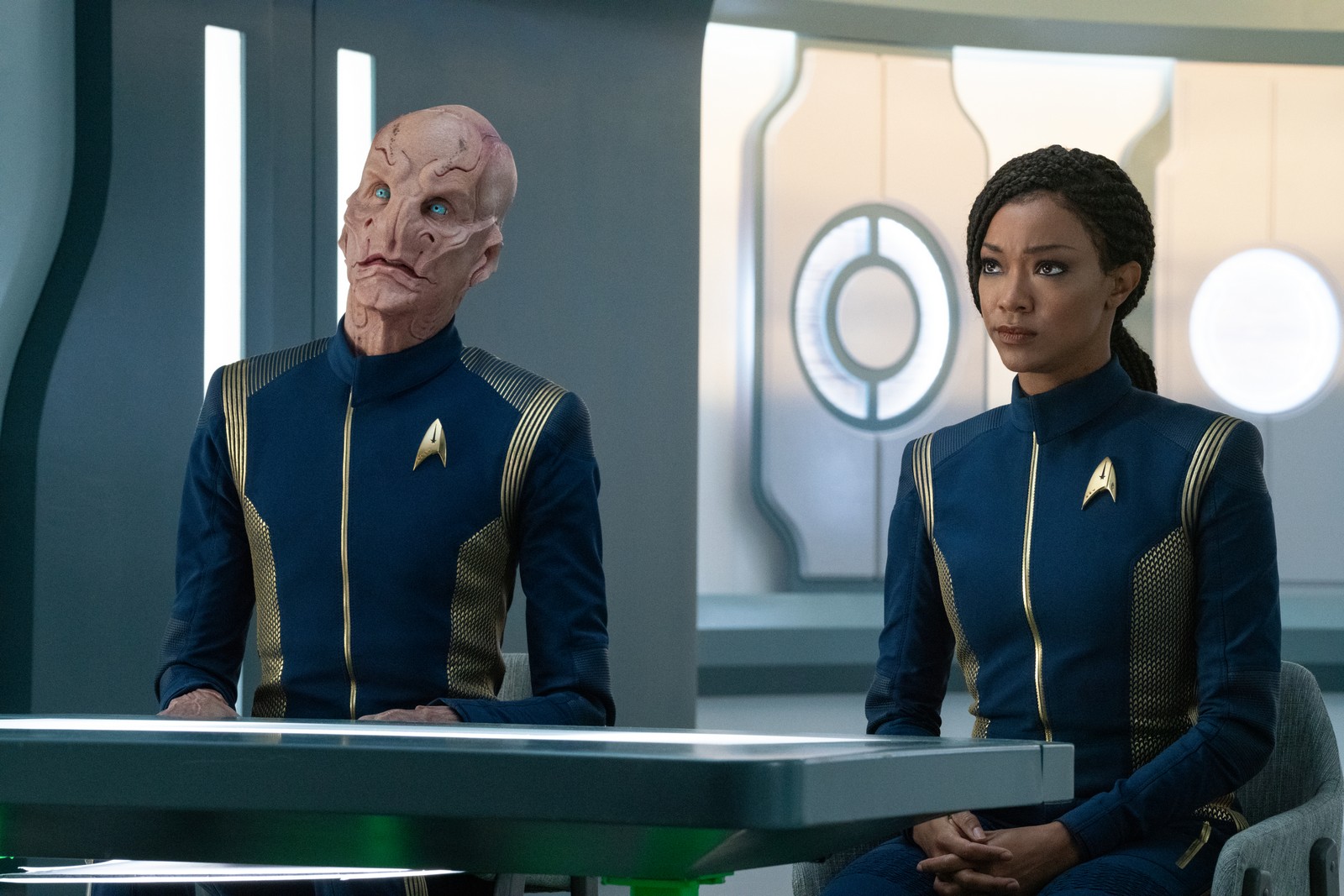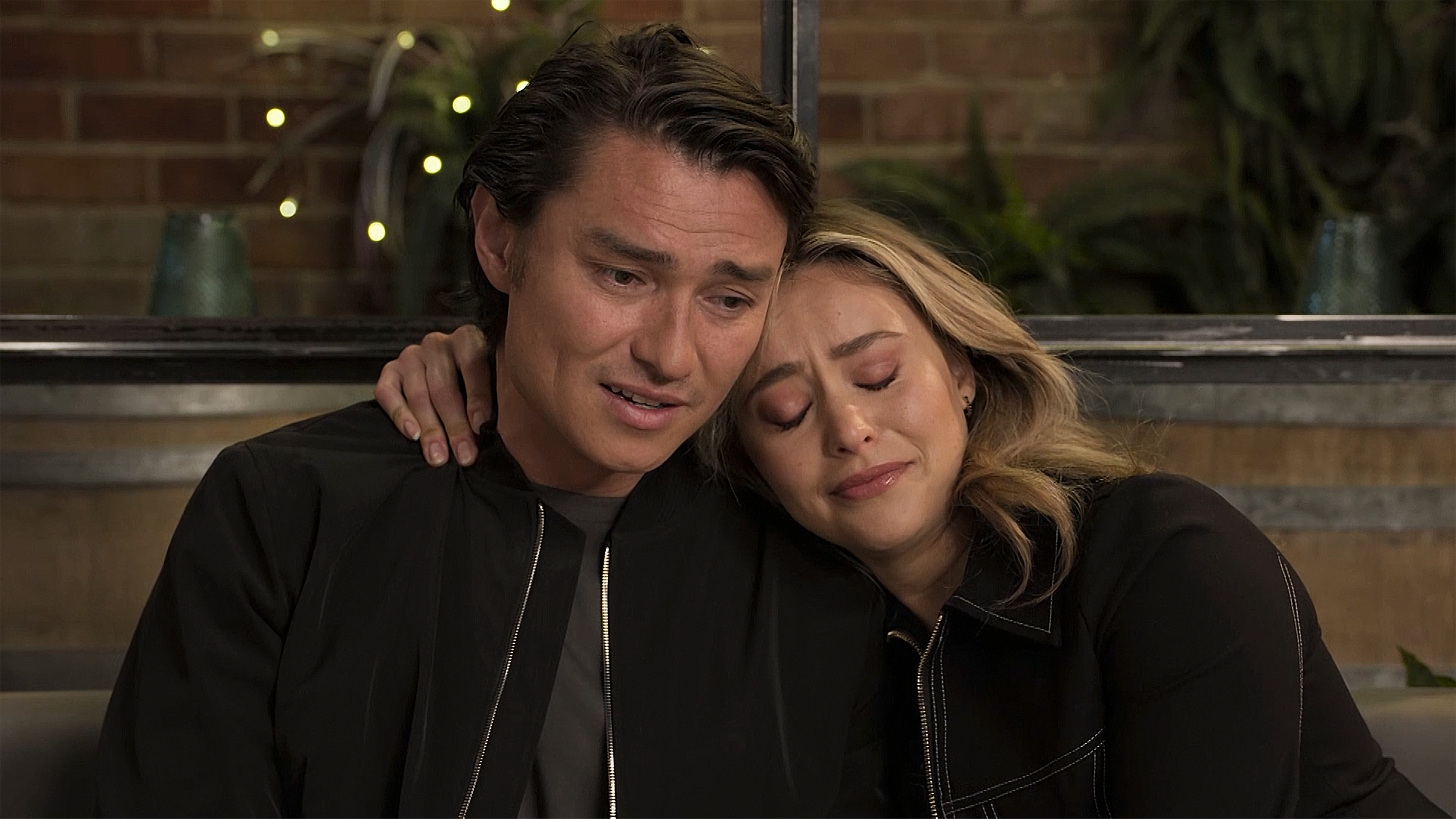What to Watch Verdict
An overstuffed episode still has a lot going for it.
Pros
- +
🖖🏻The dynamic between the Discovery and the new Federation is intriguing.
- +
🖖🏻Fun adventure in the back half.
- +
🖖🏻DAVID CRONENBERG!
Cons
- -
🖖🏻The episode is overstuffed with plot.
- -
🖖🏻Is anyone really going to miss Nhan?
This article contains spoilers for Star Trek: Discovery.
Check out our reviews of Star Trek: Discovery season 3 episodes 1-4.
It’s been a lingering question how Star Trek: Discovery would navigate its themes of self-discovery whenever it rejoined with the Federation as a whole, or at least whatever remains of the Federation after The Burn has destroyed nearly all warp capability in the galaxy. We’ve finally reached the answer to that question in “Die Trying,” which somewhat clumsily tries to bridge the gap between being a table-setting episode of the rest of the season while also offering up an episodic adventure for the crew to embark on so that we aren’t just hammered with exposition. It’s a fine way to get us primed for what’s to come, but you can also tell that the writers are probably trying to cram too many ideas into too small of a space.
The episode opens on the Discovery arriving at the Starfleet’s lost central command, marveling at the technological advancement of the past 900 years and genuinely excited to have a home again. Of course, this excitement can’t be anything but short-lived, as Michael (Sonequa Martin-Green), Saru (Doug Jones), and Adira (Bludel Barrio) are beamed aboard the base to meet the commanding admiral, Charles Vance (Oded Fehr). As Adira is taken away for medical examination and leaves the episode entirely (Boo!), Michael and Saru find that their welcome is not so cheery as they’d hoped.
In an interesting (if not intentional) inversion of usual portrayals of Starfleet admiralty, this admiral raises some pretty good reasons for why the Discovery is worthy of suspicion. The ship’s covert nature and purposeful erasure from Federation history mean that their fantastical story of traveling through time to save all organic life is, at face value, hard to stomach, and the centuries of wars in the interim were fought primarily to curtail and eradicate the use of time travel, so sitting from the position of a leader who has helped lead an organization through more than 100 years of triage, it’s pretty level-headed for the admiral to want to assimilate the Discovery into his ranks and reduce the potential for collusion against their fragile stability.
Saru sees the admiral’s perspective and opts to attempt a non-threatening posture while still advocating to keep his crew together in the spirit of family and coping with their repressed trauma. Michael, meanwhile, keeps pushing up against Saru’s authority, aggressively resisting the idea that Starfleet could hold them at such a cold distance when they have the spore drive, the means of instantaneous travel that is desperately needed to reunite the disparate planets of the Federation. Saru and Michael’s Captain-Number One dynamic continues to be interesting for its friendly antagonism, constantly calling into question whether situations call for aggressive change or incremental gains.
This conflict with greater Starfleet, though, is the impetus for the latter half of the episode, sending the Discovery on an away mission to harvest seeds from an otherwise unreachable ship to save a group of aliens suffering from an illness that only the seeds can cure. As a self-contained Trek adventure, this part of the episode is… fine. It’s not particularly deep, as the philosophical nature of the mission is perfunctory at best — more on that in a moment — but it does serve as a reminder of the skillsets and dynamics of Discovery’s almost comically large regular cast. Michael gets to stretch as a mission commander, Detmer (Emily Coutts) has a PTSD moment that Owosekun (Oyin Oladejo) talks her through, Hugh (Wilson Cruz) gets to do in-field medical examinations and be a voice of empathy, and Tilly (Mary Wiseman), Stamets (Anthony Rapp), and Reno (Tig Notaro) get to have a bantering session of classic Star Trek technobabble. It’s fun and fast-paced, though maybe too fast-paced for what could have easily been an episode in its own right.
The unfortunate fact of the matter is, though, that this half of the episode mainly exists to trim the fat on that cast list, contriving a reason for Nhan (Rachael Ancheril) to leave the crew and return to her Barzan homeworld to reconnect with her culture. In the context of the mission, which finds a Barzan scientist phasing in and out of reality as he grieves the loss of the family that lived with him on the ship, it’s a fairly touching examination of how different cultures approach notions of death and funereal rites and how that can come into conflict with supposedly more universal notions of the sanctity of individual life. However, it’s also a pretty naked excuse to get rid of a character who was never really sufficiently developed as more than a dedicated security officer, and it’s hard to imagine anyone’s favorite character is being written off in this supposedly tearful farewell.
I would be remiss not to highlight the running interview between Georgiou (Michelle Yeoh) and a federation scientist (David Cronenberg!), which is primarily in this episode to set up the realization that the future has been completely cut off from the Mirror Universe and Georgiou has no means to reconnect with the Terran people. These sequences do make an already busy episode feel more bloated, but Yeoh and Cronenberg play off one another masterfully, each arrogant and barbed in their own way but playful like they're trying to decide which of them is the cat and mouse.
This all sets the stage for the mood going forward. The admiral is still hesitant about Michael’s persistent pushes against authority, but he’s also amenable to Saru’s view that the Discovery could lead the Federation into a new Renaissance. Discovery’s search for self-identity doesn’t end with reconnection to Starfleet, but simply builds upon it as Starfleet itself is in disarray and in need of redefinition. Hopefully, this level of table-setting will not be necessary for future episodes as Discovery resumes a comfortable episodic groove, but I’d much rather have this than an episode comprised of only exposition. Next week, it looks like we’ll get a glimpse of just how Georgiou is coping with her loss.
Star Trek: Discovery is available to stream on Paramount Plus.
Leigh Monson has been a professional film critic and writer for six years, with bylines at Birth.Movies.Death., SlashFilm and Polygon. Attorney by day, cinephile by night and delicious snack by mid-afternoon, Leigh loves queer cinema and deconstructing genre tropes. If you like insights into recent films and love stupid puns, you can follow them on Twitter.












